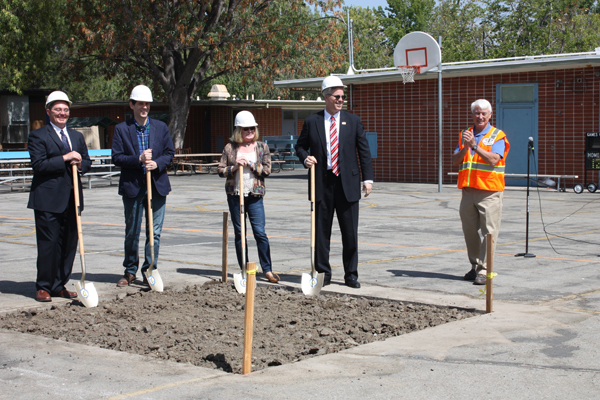CHIME Breaks Ground on New Buildings at its Woodland Hills School

From left: Erin Studer, executive director of CHIME Institute's Schwarzenegger Community School; Josh Mark, CHIME Institute board member; Michelle Haney, CSUN special education professor and chair of the CHIME Institute Board of Directors; Michael Spagna, dean of CSUN's Michael D. Eisner College of Education, and Dewayne Cargill, construction manager for Pacifica Services. Photo courtesy of Annie Cox.
Educators from California State University, Northridge joined CHIME Institute officials in June to break ground on two new buildings at the institute’s Woodland Hills public charter school site, which will provide CSUN researchers greater opportunities to study the institute’s acclaimed inclusive learning environment.
The new buildings will replace 10 temporary brown and blue portable classroom bungalows that now serve the some of CHIME Institute’s Schwarzenegger Community School’s 730 students.
“The new buildings are a continuation of our efforts to provide a high-quality learning environment for all children,” said Erin Studer, CHIME’s executive director of charter school programs. “We’ve had the temporary bungalows since 2010, and it’s time to get rid of them. The buildings will make a long-term difference in the education of all our students.”
When finished, the new buildings — located near the south side of the K-8 campus at 19722 Collier St. — will include 16 new classrooms, including two science laboratories, and a new library. The $10 million project, funded by state Prop. 55 and Los Angeles Unified School District bonds, is expected to be completed in June 2015.
The new buildings, each two stories tall, are “universally designed” to be fully accessible to ensure that all the students at the school can get where they need to go without a problem. The school is hailed as a national leader in inclusive education, where children who develop typically, children with special needs and children who are gifted learn side by side. Access to the second floors will be via ramps “so students are not separated from their friends while changing classrooms or going to recess or lunch,” Studer said.
Classrooms in the new buildings also will include one-way observation windows to ensure that CSUN researchers, who often use the school as a teaching-demonstration and professional-development site, do not disturb the learning process.
“The new observation areas are continuing a collaboration that CSUN has had with CHIME from the beginning,” said Annie Cox, executive director of CHIME’s early education programs. “It’s something we’ve been doing for years — providing a space for CSUN researchers to study and learn what we do — in the infant/toddler and preschool program. We’ll now have greater opportunity to provide the same opportunities at the K-8 school.”
Michael Spagna, dean of CSUN’s Michael D. Eisner College of Education, said the partnership between the university and the institute is invaluable.
“CHIME continues to be a shining light for our partnership with local schools,” Spagna said. “It’s a model that everyone can learn from in the community. Any expansion that takes place there is for the benefit of the community. The additional space can only add to the quality education that takes place on that campus. It allows the institute to extend its their already established margin of excellence.”
Established in 1990, the CHIME Institute is a national leader in developing and implementing model programs and dynamic research and training environments to disseminate best practices in inclusive education. The institute’s research and training center is housed in the Eisner College of Education.
The institute began with an early childhood education program based on the CSUN campus. The success of that program, coupled with needs of the community and sound research, prompted a group of parents and CSUN faculty to develop a public charter elementary school in 2001 and a public charter middle school in 2003. The two schools merged into a K-8 school located in Woodland Hills in 2010.
Inclusive education at CHIME means that children who reflect the demographics of the surrounding regions learn side by side. CHIME’s model allows for the individual needs of each child to be addressed in a manner that enhances each child’s strength while also providing educational progress.
CHIME also serves as a model for educators through its partnerships with the Eisner College and the Los Angeles Unified School District. It facilitates research opportunities and regularly hosts visitors from around the United States and the world who are interested in replicating its successes in their own schools. The institute has been recognized by the U.S. Department of Education as a model for full inclusion of students with disabilities and for providing a blueprint for local schools across the country.

 experience
experience